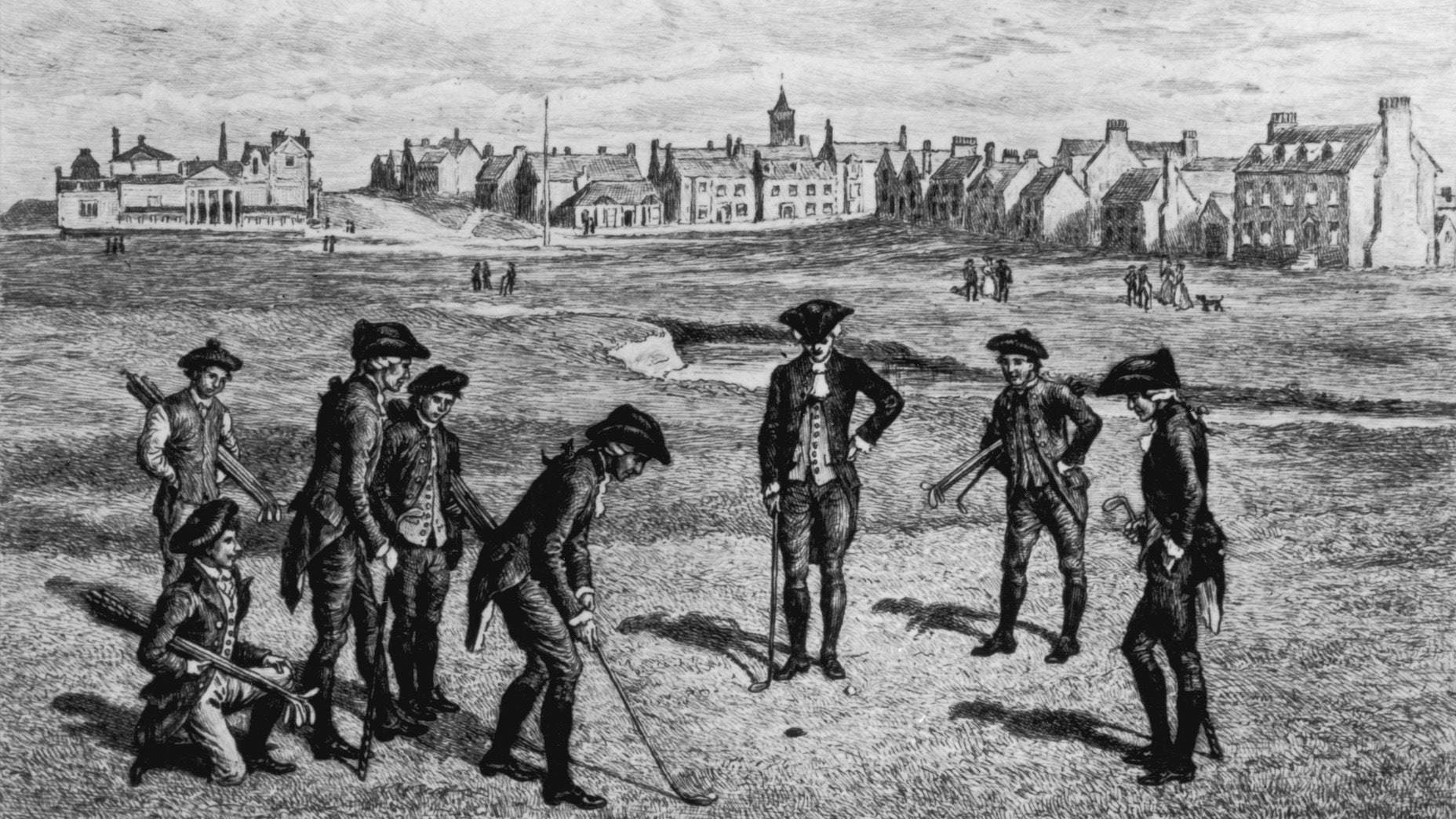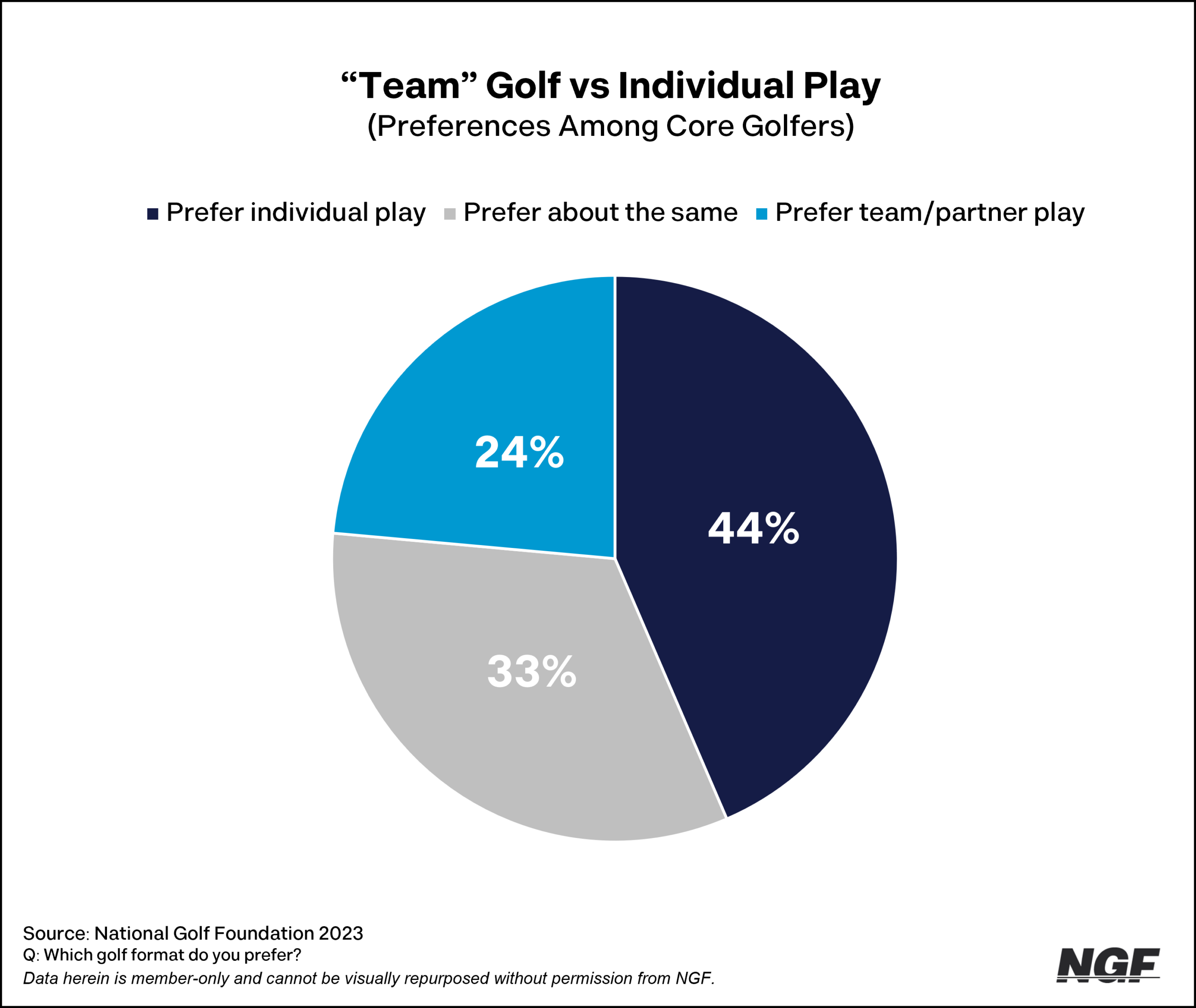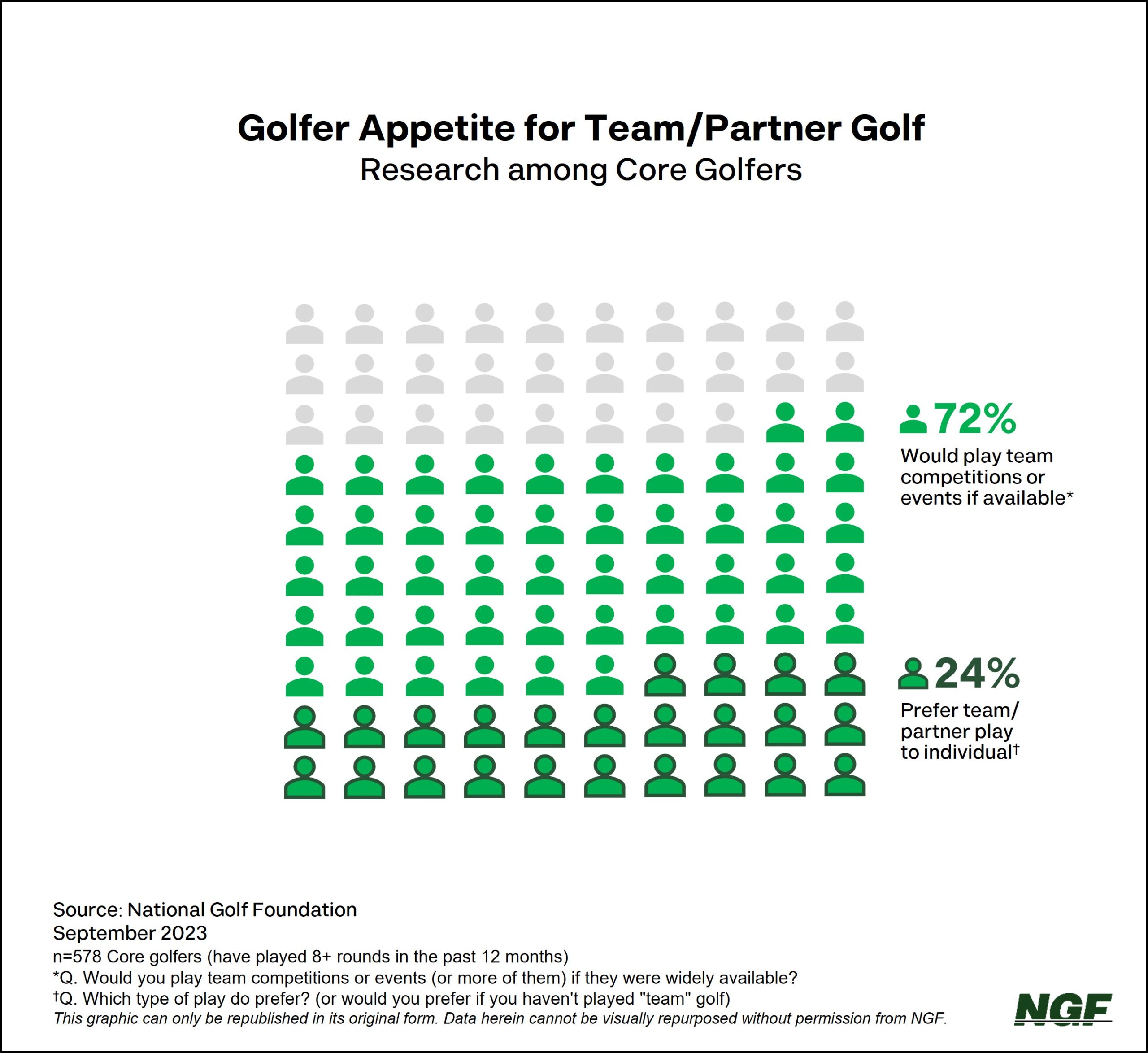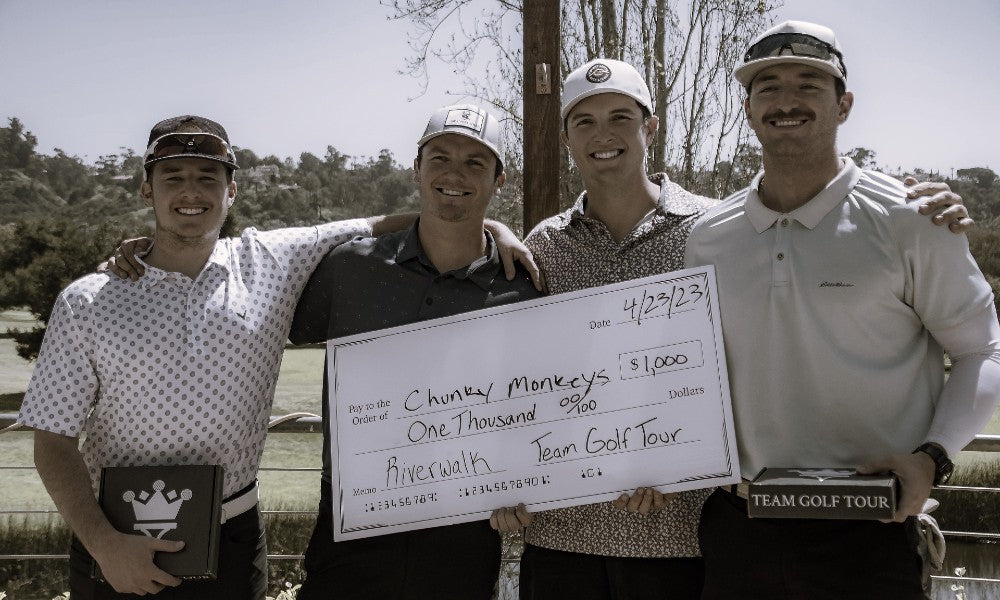One of the identifying features of golf is that it's in a small subsection of sports that are largely played as individuals rather than as part of a team. It can be part of the appeal of the game since you don't need to coordinate schedules with teammates or rely on someone else. You can simply show up and play your game. However, it can also quickly turn into a detraction when you realize that a major benefit of time on the course, or any playing sport for that matter, is socialization. The freedom of your solo venture can quickly turn to isolation.
If you've had that experience with golf, you might be pleased to know that team golf has made quite the surge in recent years. While the sport is still predominantly played in individual formats, there are seemingly more opportunities than ever to team up with other golfers. The question is, will this become the new normal for golf, is it a passing fad, or will golf find a happy medium between solo and group play?
Why Isn't Golf a Team Sport?

Getty
One of the fundamental concepts in sports is teamwork. It's why so many parents encourage their kids to play youth sports. It's why the professional squads with the most talent don't always win the championship. It's why CEOs love to cram sports metaphors into every staff meeting. So why, then, is golf played largely outside of a team format?
The simplest answer is because that's how the game has always been played. It makes sense why golf originally formed as an individual sport; you play your own ball, you use your own equipment, you keep your own score. There's virtually nothing your opponents can do to impact your play. It's essentially you versus the course.
Outside of playing formats like a scramble, where your teammates' play does have a noticeable effect on your own, most team play formats are still largely based on individual performance. While one player may not be able to carry an entire team on their own, the winner is still usually determined by which group has the best collection of individual players.
All this considered, it may appear like golf is simply an outlier in the sports world that's better served as an individual endeavor. And yet...
Professional Golf is Becoming Team-Oriented

LIV Golf
When you look at the major developments of the past few years on the professional golf scene, they're largely centered around organizing golf as a team sport. The most obvious example is LIV Golf, which introduced a number of shake-ups to the traditional golf format including organizing players into teams that compete for a season-long championship. The new tour has divided golf fans and has yet to develop a substantial audience in the first two years, but has remained adamant in promoting the team concept and claiming it as the future of golf.
Then we have the TGL, the indoor, tech-based golf league with three-player teams scheduled to kick off next year. While the league has yet to play an match, it already has secured participation from some of golf's biggest names and investments from other athletes and owners from other professional leagues. This hints at another reason the pro circuit could see a shift towards team competition: the opportunity for outside investment, either through the traditional American sports model or the Formula 1 model where teams are organized under manufacturers. One the PGA Tour's major issues currently is creating competitive purses and financial incentives to keep it's players happy, and the chance to alleviate that pain point could prove enticing enough to make a change.
Another example to consider on this topic is the Ryder Cup. Far from a new development, the Ryder Cup is easily the most popular example of a team event and is generally one of the most watched golf tournaments outside of the majors. While viewership in the US has waned in the post-Tiger years, it has seen an uptick recently in two important categories: under-35 and European viewers, which also represent two of the largest growing segments of golfers since 2020.

Getty
One explanation could be that the USA vs. Europe format offers an easier entry point for the casual fan because deciding who to root for is more straightforward. To become truly invested in PGA Tour events, it generally requires having some knowledge of the players and storylines which can be difficult to track if you only tune in a few times a year. And even if you do find someone to cheer on, your player could be out of the running after the first round and cause you to lose interest in the rest of the tournament. With the Ryder Cup, it's simple: you root for the players representing your country/continent. It's why I'm somewhat surprised the Olympics haven't figured out a team golf event while we see gymnasts, swimmers, and runners all get the opportunity to do so. As the PGA Tour continues to try to find it's next Tiger, could it move from generating star power to rallying behind team identities?
The golf audience is expanding and professional tours are going to seek ways to capitalize on this surge in potential consumers. It's natural for all professional sports to make alterations based on their interpretations of what will attract the next generation of fans. But is team golf what golfers actually want?
Are Amateur Golfers Interested in Team Play?
We've covered what the pros think, but golf has always been a sport where the number of people who play far exceeds the number that watch it on TV. Therefore the health of the sport will always largely depend on you, the amateur golfer. So how do amateur golfers feel about team vs. individual play?

NGF
According to survey data from the National Golf Foundation, 90% of core golfers (golfers who play 8+ rounds per year) have played in a team event at some point and 77% have done so in the past 12 months. Despite the vast majority participating in formats like scrambles and best ball, though, the majority of respondents reported that they play individual golf more frequently. Furthermore, when asked whether they prefer individual events, team events, or both equally, the largest portion (44%) leaned towards playing by themselves.
It is notable, though, that over half the golfers asked this question responded that they liked team formats more or the same as individual ones. Also, while a large percentage claim to prefer solo play, that doesn't mean they're not also interested in the occasional team up. In fact, nearly 3 in 4 golfers say that they would play in more team tournaments if they were more widely available.

NGF
Perhaps the most interesting data point in all of this is the reason why golfers enjoy playing as a team. We discussed the playing logistics behind the debate of individual vs. team, but we also touched on the idea that a key benefit to playing a sport is being a part of a team. The two largest advantages to playing on a team that golfers cite are the social component/camaraderie and the opportunity to compete for someone other than themselves. It's another reminder that at the end of the day, we play golf to have fun. And for many of us it can be more fun, or at least a welcome change of pace, to genuinely congratulate our playing partners on their good shots instead of muttering a hollow "nice one" while cursing them under our breath.
Instead of debating whether golf should be either a team sport or an individual sport, let's celebrate the fact that it can be both. There is an inherent individualistic nature to the game that will never change, but that doesn't need to rob us of the chance to partner up from time to time. Just because there's only one green jacket handed out each year (as there should be) doesn't mean that every tournament needs to work the same way.
Where to Play in Team Events
If you're part of the 72% of golfers that is looking for more opportunities to play team golf, luckily Southern California has a number of outlets to do so. You just need to know where to look.
SCGA Team Play

One of the largest team golf events you'll find anywhere, SCGA Team Play annually hosts 230 teams comprised of over 8,000 golfers from across the Southland. Participating clubs may enter one 16-person team in a weekday league, a weekend league, or both.. Clubs are arranged in groups of four, and their respective 16-person teams play a series of six home and away matches within their assigned group. All competition includes both single and four-ball match play. Group winners then meet in single elimination playoffs, culminating in an 18-hole championship.
SCGA Team Play is open to all SCGA Member Clubs. If you're not part of a club yet, you can find one to join or start one of your own.
Team Championships

Think you've got the dream team and want to see where you stack up against SoCal's best? The SCGA hosts team championships throughout the year, including Four-Ball formats and Mixed Team events. Your team can compete in either gross or net competitions, so anyone can take a shot a the title regardless of your Handicap Index.
Twilight Golf Association

Twilight Golf
If you're looking for something a little more casual, Twilight Golf has weeknight 9-hole leagues throughout the region. You can play in either a 2-person scramble format or a 4-person team where points are awarded based on how well you play, adjusted for your skill level. Players can register as a full team or as an individual and be paired up with other participants.
Team Golf Tour

Team Golf Tour
As the name implies, Team Golf Tour runs monthly team tournaments in Los Angeles, Orange County, San Diego, and Ventura. Each event is generally a 4-person scramble format with an available Mid-High Handicap flight for teams with an average Handicap Index of 15+. Teams can pick and choose which tournaments to play in, or compete in all 10 throughout the season for a chance at a spot in the season-long championship.
SCGA Clubs

Babes Golf
If none of these specific options fit what you're looking for, there are thousands of SCGA golf clubs that offer individual and team competitions throughout the year. Whether you have a favorite course or love to travel to new courses, there's no shortage of chances to find people to play with wherever you call home. Check out the SCGA Club Finder tool to find one near you.


